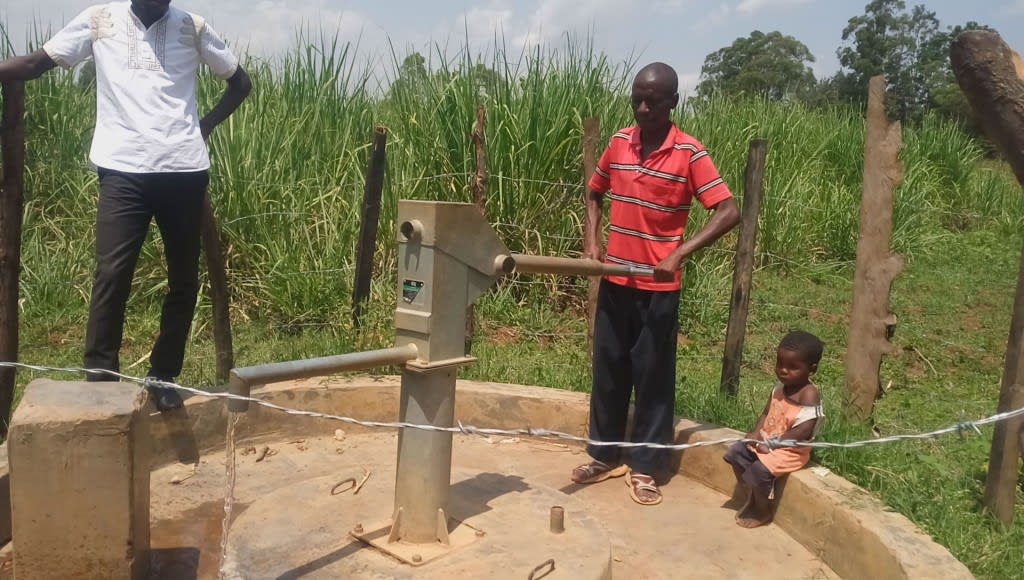This project is a part of our shared program with Safe Water and Sustainable Hygiene Initiative (SAWASHI). Our team is pleased to directly share the below report (edited for clarity, as needed).
Welcome to the Community
Matsakha A Community is surrounded by sugarcane plantation farms on all sides. The community's farmers also plant short-seasoned crops such as beans, maize, potatoes and other kinds of vegetables. Matsakha A is home to 150 people from 15 different households. Both men and women are the breadwinners for their families. Most of the people are Christians who attend churches of different denominations such as Friends Church Quakers, Impact, and Deliverance Church. Most children in this community get their education in a public primary school called Matsakha Primary.
Due to alcoholism, a large number of men have abandoned there responsibilities as fathers and breadwinners, therefore making it difficult for many mothers to carry all the household responsibility. To ensure that their families are well-taken care of, women are therefore forced to engage in many different activities including small business and manual labor for which they are payed poorly. Overall, the living standards of people in this community is poor.
Water Situation
Kenya Finland Company approached Matsakha A Community to dig a hand-dug well in 1985. A few years later, the pump was stolen and most likely sold in parts. To take advantage of the water inside, community members soon after decided to tie a bucket to the end of a rope to replace the pump. Over 20 years later, this method of fetching water and an old, broken well pad are allowing a high level of contamination to reach the well's water. Community members often complain of typhoid and diarrhea as a result of drinking this dirty water.
Sanitation Situation
Most households have dug a pit latrine made of mud and banana leaves, cloth, or iron sheets for doors. No more than half of families have a dedicated room for personal hygiene; for activities such as teeth-brushing or bathing. At least half of women have a clothesline and dish rack to dry their family's things. Everyone disposes of their garbage in the surrounding fields and plantations. It's apparent that some families have heard about good hygiene and sanitation practices, since they have a few good facilities. However, many still need to learn and be encouraged to take important steps in improving their health. Many tools are cheap and accessible even to the poorest of families. Just one family practicing an unhealthy lifestyle can spread disease in a tight-knit community. Farmer Jackton Kisembe says that "due to poor hygiene and sanitation practices in our community, the outbreaks of waterborne diseases have become rampant. This has affected our livelihood, since a lot of money is spent on medical bills."
Plans: Hygiene and Sanitation Training
All members of the community will be invited to three days of hygiene and sanitation training. The facilitator will use the PHAST (Participatory Hygiene and Sanitation Training) method to teach the following topics and more:
- Proper water storage and treatment
- Disease transmission
- Personal and household hygiene
- Proper waste disposal
- Proper food preparation and storage
- Building a strong water user committee
The facilitator also plans to take participants on a transect walk to identify and analyze practices among households. They will label what is detrimental or helpful to good health, and will brainstorm how to improve conditions. The water user committee will be tasked with overseeing and managing the rehabilitated well.
Plans: Well Rehabilitation and Hand-Washing Stations
The water point is a hand-dug well with culvert lining in it. It has a total depth of 8.7 meters and has a static water level of 3.4 meters. The well pad has cracks and dismantled edges. There is no pump in place on this well, but only a well cover. The well is littered by pieces of sticks, plastic bags, containers, and sugarcane cuttings. Someone will have to be lowered into the well to clear it out, and the well pad will have to be entirely demolished so a new one can be built. Once the new pad cures, a new Afridev pump will be installed.
Two hand-washing stations will be delivered in time for training so that they can be used for demonstrations and practice. The community will be taught how to fill and clean the containers.
The community's chief has been pivotal in the start of this project. He sent us the application for rehabilitation and invited us to see the well and community firsthand. He has informed the entire community of upcoming training and construction efforts. He and all the local leadership have promised to help with any needs that may arise during the course of this water project.

 Protected Dug Well
Protected Dug Well






















